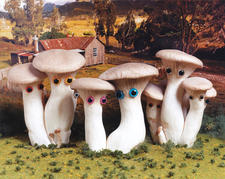Granta 127: Japan

Edited by Yuka Igarashi
Various authors
Granta Publications Ltd (24 April 2014)
272 Pages
ISBN-10: 1905881770
Review by Chris Corker
Granta Literary Magazine, established in 1889 by students of Cambridge University and since then a front-runner in the promotion of all forms of storytelling, has now released an edition focusing exclusively on Japan and its culture. Combining fiction and photo exhibitions, this volume offers something exciting and unfamiliar for those uninitiated in Japanese culture, and likely to induce nostalgia in more seasoned Japanophiles. The accessible familiarity of many of these stories may border on the trite for anyone already au fait with the culture, and those readers should not approach the collection expecting to have their preconceptions challenged. Those less familiar with Japanese culture, however, will gain a basic understanding of Japanese society through an enjoyable, accessible medium.
In terms of theme, many of the stories understandably feature the Tohoku Earthquake, which has affected every Japanese person, regardless of their geographical location, highlighting a constant, underlying threat to life in an otherwise incredibly safe society. A secondary theme is one of loneliness and isolation, either self-imposed or forced. Many of the characters feel that they have few or no connections to society, that their future is a persistent weight on their shoulders. After the Earthquake, many people lost their homes and belongings as entire neighbourhoods were swallowed by the tsunami, leaving them without base or identity. Other themes include the treatment of the elderly in an increasingly ageing society; Japanese-Korean relations; being a foreigner in Japan; loveless/sexless marriages; and lagging gender equality (it is worth noting that many of the protagonists in this collection are female). In this review I will focus mainly on two of the stories – one by a Japanese author, one not – and write briefly on a few more that deal with these topics and others.

‘A Clean Marriage’ by Sayaka Murata is the first story in the collection and drops the reader right into the microcosm of Japanese married life. The style of writing is very dry and economical, representing the marriage, which from the start seems devoid of passion, the convenience of the couples’ life together taking precedence. We are told immediately that their marriage is Platonic. Recent surveys suggest that anything from a third to 40% of marriages in Japan are sexless, with work commitments, lack of personal space and no desire to have children being cited as reasons by couples, and the increasing preponderance of the nuclear family has proved just as much a mixed blessing in the Japan as in the UK. The husband and wife in the story both seem very content with the arrangement – both of them in employment, dividing chores up evenly and seeing other people for sexual fulfillment – until the topic of children is discussed. Averse to sexual relations with each other, they decide to undergo a treatment using the ‘Clean Breeder’. As their doctor explains:
‘[I]t is a means to facilitate, in the purest sense of the word, reproduction. The aim of sex as a medical treatment is not to provide pleasure.’
Here the modern ambiguity of gender roles is brought into focus, the biological imperative being replaced by the technological and clinical; it is the man in the story who adopts the archetypal female role, becoming anxious and being selected as the focus of the procedure, succumbing later to morning sickness-esque nausea. In ‘A Clean Marriage’ the intersection of contemporary family life, convenience and scientific progress is put under the microscope, the removal of antiquated ideas and gender stereotypes facing off against the de-humanising element of this evolution, and the reader is left asking whether or not anything in life should truly be ‘clean’.
‘Variations on a Theme by Mister Donut’ by David Mitchell is a story that reproduces his, now famed, narrative technique. The split perspective – which Mitchell used in both Ghostwritten and Cloud Atlas – is put to good effect here, not only offering a different viewpoint on the same tale, but with each voice revealing a clue that uncovers something new about the previous narrator. Mitchell taught English in Japan for 8 years, and his detail adds authenticity to the story. Anyone familiar with Japan will recognise the range of characters that descend on Mr Donut – a foreigner teaching English and suffering an existential crisis; a phone obsessed teen channeling Japan’s sexualised ‘Hello Kitty’ gender stereotype; a senile old man mumbling about the war; and the polite, earnest shop worker who freezes like a rabbit in the headlights the moment Japanese emerges from a foreign mouth, reflecting that her one English phrase, ‘Is this a pen’, never seems to come up in daily conversation. All these personalities clash in the diminutive setting of Mister Donut (a fast food café).
While each of these views offers its own social commentary – the old man bigoted, unable to forget the war, treated with disdain by the younger generation; the foreigner using Japan as a mere pit stop in his life journey, hunting for Japanese girls (‘Gaijin groupies’) by night; the young girl so consumed by technology and social media that she loses her sense of differentiation between reality and reality-TV – the main theme running through this story is one of loneliness. Each character, whether through his or her own self-imposed circumstances, or ones forced upon them, is isolated from others, in a society where, as the waves of people and progress crash down, it’s easy for the head of one person to slip beneath the surface. The foreign English teacher’s solution is simple enough: ‘Befriend loneliness.’ This advice is no use to the old man, whose own loneliness acts only as a painful reminder of his sweeter memories, his own mortality tainting the present.
Further stories include Andres Felipe Solano’s ‘Pig Skin’, in which a man is fascinated by a Korean he meets on a ferry and is drawn into a seedy plot that becomes the material for his own book. As well as depicting Korean-Japanese relations, this story also discusses Japan’s decadent generations of previous authors, whose lifestyle was said to be a rejection of the nationalistic sentiment prevalent before and during the Second World War. ‘Printable’ by Toh Enjoe is a metafictional story that highlights the plight of the translator, who re-creates another’s work but never creates anything of their own. Finally, ‘The Dogs’ by Yukiko Mototya is a pleasant surrealistic story of a woman who withdraws from society to an isolated cabin in the snowy mountains. Here she meets a pack of small white dogs who she adopts as a substitute for human companionship. As her detachment from society deepens, the people around her become surreal.
The photographic art interspersed throughout the volume – some photos old and black and white, others modern and vividly colourful – is a pleasant diversion. Yuji Hamada, whose work ‘Primal Mountain’ also features on the cover of this edition, has attempted to create hyper-realistic mountains from pieces of tinfoil, superimposed on an authentic Japanese skyline. He writes that this is his response to the unreliable information that was released to the public after the Earthquake. ‘The information that was broadcast by the media, the information that we received, didn’t match up to the reality that was before our eyes […] I wanted to make something that showed ‘real’ and ‘fake’ becoming friendly with each other […] It is not the maker of the images who establishes and delivers what is seen.’ This contrast between what appears on the surface and the truth hidden below – the subsequent disillusionment and detachment – are familiar themes in many of these stories, adding an interesting and serious undercurrent to the quirky and rich cultural heritage that many already associate with Japan. An interesting read.

